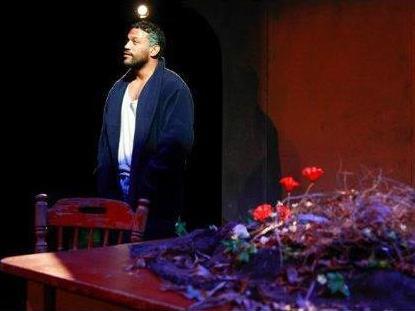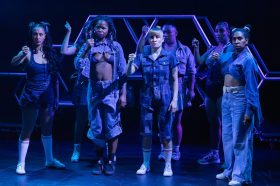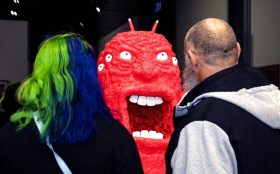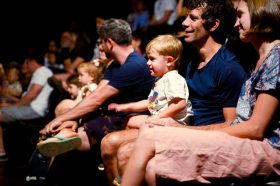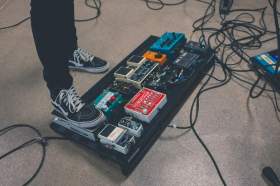Here is a play that will have you laughing one minute, and puzzled the next. It will have you laughing at the absurdity of planting a garden in a kitchen, and then wondering about the way we fail to communicate our deepest fears and the way we attempt to escape our loneliness. It will astound you with two consummate performances from actors Aaron Fa’aoso and Jimi Bani. It is easy to follow yet difficult to categorise.
Two half brothers come together for the first time in ten years, held apart by differences of personality (one is an ageing extroverted boozer, the other a lonely recluse).They are bound together by their relationship with their deceased mother and her legacy, an equal share in her house. At first the atmosphere is antagonistic, and laced with sarcasm. The rapid-fire, compressed dialogue is frequently punctuated with meaningful silences. It reveals long-standing tensions and grievances, and seemingly irreconcilable differences of outlook and character. Yet, from inside the silences a common bond starts to grow. Call it brotherly love, or call it chiacking and scrapping: it’s the same thing. When, toward the end, the brothers wrestle playfully with each other on the kitchen-garden floor, we come to realise where the play has been taking us all along. Publicity material suggests that it is about cracking the code of male communication to satisfy a deep longing for emotional connection. While I agree, I also think it goes beyond that. You don’t have to be male to know and recognise that sense of longing. There is a universal quality here. Like the brothers, we all struggle to understand the meaning of our lives, the ‘Why am I here?’ question. We all have to come to terms with the truth of who we are, and choose how to respond to that hard-found understanding. We all have to choose our future paths and the choice is ultimately a matter of morals and values.
It must be admitted that we generally find the universal in the particular – a paradox, I know, but one that was well understood by playwrights as diverse as Henrik Ibsen, Arthur Miller and Ray Lawler. Not so in this play. Daniel Keene eschews the particular, and the stage designers, Simona Cosentini and Simone Tesorieri have faithfully carried out his intentions by creating a very basic set – bare dilapidated walls, a wooden kitchen table, and some chairs. That’s it – at least until the garden arrives.
The lighting by Glenn Hughes and, especially, Nicholas Mills’s sound design, contribute enormously to the overall ambience and the play’s progression from despondency to delight. The birdsong and jazz music are really effective. In a production that is technically very difficult to bring off, Suellen Maunder’s direction is sure-footed and sensitive. She has brought out the very best in her actors – and that’s really saying something.
At first, I found it somewhat strange to see Aaron Fa’aoso and Jimi Bani in a suburban setting. I have seen them on television in Mabo and The Straits, and admired their skill and flexibility in performance, but the setting has always been the Torres Strait. How easily we typecast our actors! Their performances on stage made me realise just how limiting that is – both to the actors and to ourselves. They brought to the fore the universality of the play’s theme. Both men portray a complex range of emotions and reactions. Fa’aoso, as Luke, has a cheeky grin and a nonchalance that masks his insecurity. Bani, as Ned, has the sad-funny face of a comic and he uses it very well to gain the sympathy of the audience. All he has to do is lift an eyebrow, and a wealth of new meaning is created.
While Luke’s macho physicality is contrasted with Ned’s floppy ungainliness, Luke’s blundering determination to create a garden memorial for their mother in the kitchen overcomes his brother’s refusal to care about tending the grave. The study in contrasts is matched with a realisation that underneath it all, there is a common humanity, and a deep longing for love. So that, in the end, the play is about reconciliation and redemption. And what better way to underscore that than to cast two indigenous actors in the lead roles?
Half & Half
By Daniel Keene
A Lone Star and JUTE Theatre Co-Production
Directed by Suellen Maunder
Designers: Simone Tesorieri & Simona Consentini
Lighting Designer: Glenn Hughes
Sound Designer: Nick Mills
Featuring Aaron Fa’aoso & Jimi Bani
JUTE Theatre, Centre of Contemporary Arts, Cairns
23 August – 1 September
(Pictured: Image: Romy Siegmann Photography)
